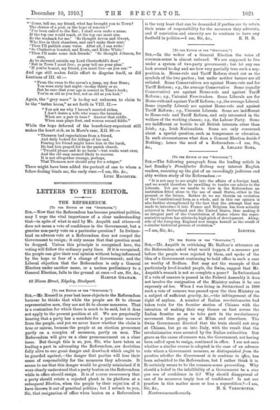[TO THE EDITOR Or THE "SPECTATOR. "] SIR,—Mr. Asquith in criticising
Mr. Balfour's utterance on the Referendum asked what wuld happen if a measure put before the people were rejected by them, and spoke of the idea of a Government continuing to hold office in such a case as worthy of Bedlam. But may not the example of that particularly level-headed people, the Swiss, suggest that Mr.
Asquith's remark is not so complete a poser? In Switzerland if a vote of censure is passed in the Federal Assembly it does
not involve the resignation of the Ministry unless it be one expressly ad hoc. When I was living in Switzerland in 1898 such a vote of censure was passed upon the then Ministry on a subject of sufficient gravity, &c.,—the infringement of the right of asylum. A. number of Italian revolutionaries had taken train for the frontier station of Chiasso with the intention of making their way thence on foot across the Italian frontier so as to take part in the revolutionary movement then going on at Milan and elsewhere. The Swiss Government directed that the train should not stop at Chiasso, but go on into Italy, with the result that the revolutionaries were arrested by the Italian authorities. But grave as the cause of censure was, the Government, not having been called upon to resign, continued in office. I am not sure whether a similar course is adopted in the case of an adverse vote where a Government measure, as distinguished from the question whether the Government is to continue in office, has been submitted to the Referendum, but I rather think it is. It certainly seems to be the common-sense proceeding. Why should a belief in the infallibility of a Government be a sine qua non of confidence in it ? Why should disapproval of one of its measures imply loss of confidence P Is not our practice in this matter more or less a superstition P—I am,


























































 Previous page
Previous page